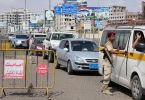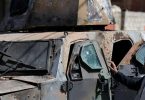By Fatima Q. Al Hattami
The year 2013 was getting ready to set out of the calendar when I left Sanaa, and little did I knew that it would also be my last contact with the city up until the moment. As I was leaving, my eyes were wide open trying to collect as much as they could of the city beauty that was starting to dress in black. My mind and memory are full of nothing but splendid nostalgic recollections for a city that gently hosted me for more than twenty years. I lived through the February public uprising and created aspirations with other fellow dreamers for a better tomorrow that has not come true yet. It turned out they all were daydreaming, and our hopes were stricken into the hard reality that was nothing but bloody wars and grinding economic crises which left our wills paralyzed. A year after my departure when the city fell into the clutch of the Houthi militias who tightened their grip over several cities in the country, the future of the country started swerving out of any possible control. The people woke up to the grisly discovery they are sucked into an endless black hole. People walking on the street of the sad Sanaa city can hear the groaning of sick people and the rumbling stomachs of the hungry. The path of the passersby is not without the faces of the desperate who are facing the unimaginable. A city that goes back deep in history and known for its beauty is now shrouded in mystery and is turned into the worst man-made humanitarian crisis recognized by the whole world but its rulers. Yemeni women especially have been suffering silently so much that when asked about their lives so many wanted to tell their stories to release some of their pains away knowing that all their complaining words are going to fall on deaf ears.
Najlaa, a math teacher in one of Sanaa public school says there is not much to speak about the misery of teachers who have not received any payment for the last one and half year, but for the negligible payments they received every couple of months which stopped now. Najlaa notes that they are now unconceivably needy. “We had to leave the houses we rented after the landlords grew impatient of our inability to pay the rent and we feel like beggars who ask for charity as we wish for some donations from merchants.” Adding salt to injury, even merchants cannot do much of giveaways due to the Houthis’ policies of forced donations. The math teacher feels even sadder when she remembers one of her colleagues who is around 60-year-old and struggling to provide for his sick daughter as well as her brother who lost a limb in one of the former armed clashes that erupted in the capital. Cataract is invading his eye threatening of vision lost and medical treatment is not an option in these dire conditions. All he could do is sit and wait for any donations that can help him do a surgery to save his vision. Najlaa concludes that a humane life is far-fetched to them, not any more all thank to the bloody militias who came to rule the country. Hunger and humiliation are but a simple part of the life in Yemen, a story whose events exist in every single city of the doomed country. Samar, fled Sanaa with her two children when it was under heavy raids by Saudi- led coalitions. Samar came across some families who also fled the capital after their houses were leveled to the ground and were accommodated by some relatives in other cities. However, the hosting families became also unable to further provide for the displaced families since they also do not have any regular income, like all Yemenis now. How on earth could Houthis expect us to go on and provide for our families if they are not paying the salaries?” wonders Samar. Families receive humanitarian aid from time to time, but they are way too short of helping all the needy.
The years of injustice and subjugation prior to Houthis’ storming the capital are only dreams now. Thuraya says Houthi militias have introduced the Yemeni people to new meanings of oppression and took tyranny to a new level. Her father works for the military but has not received any paycheck for long months which made her brother the only supporter of the family, not forgetting his own family as well. Thuraya talked about a neighboring family who also was forced to evacuate their simple house and live in a single storage unit. Parents and children are all piled up in that unit. In these dire circumstances, widows are not an exception. According to Thuraya, a widow who used to live on the salary of her late husband became unable to buy the basics for her children. She finally went to neighbors asking for some help, with teary eyes. Each tear speaks volumes of several nights she slept hungry with her children. Tragedies are constituent of the life of Yemenis now. According to Kareema, an English teacher in one of the institutes, she used to receive $1000 per month but with the uncontrollable prices inflation it is almost nothing. Her salary was reduced to YR 20000 paid in separate payments which makes it even useless. Kareema describes the living conditions in Yemen as inhumane and abhorrent. People are not able to speak against the militias and those who dare are goners. A teacher at Teaching Language and Translation Center affiliated with Sanaa University said they also face considerable difficulty whenever it comes to receiving their payments. The only difference is that they need to go on a strike every time they want to receive their payments. The last strike they held was dismissed by the administration who demanded teachers to go to their classes.
Students of the different grades and schools have their own fair share of the crises. Haneen is a student in the pharmacy school who dreamed big through her long school years. She says her last high school year was concurrent with the Decisive Storm by Saudi-led coalition after the Houthis’ control of the city. Her dreams were overcast with bloody events that forced her to reduce her plans from travelling abroad to only finishing her school year safely. She struggled to study English language prior to going to pharmacy school and still struggles everyday she sees her father grows more unable to fulfill his responsibilities towards his big family of six.
Death seems to find his way to everyone and everything easily with the militias control. Reem and her father are only two of thousands of silent victims of Houthis’ policies. The father was not able anymore to support his family and reluctantly agreed to go to the battle fronts on the promises he would receive monthly payments to save his family the need to look for help. However, before he gets to go to the front, he entombs his daughter, Reem, who mistakenly took her own life with the rifle he got from the militias. The father was also killed in the front and a whole family was reduced to only the mother.
Stories are never-ending, and agony is constant with the situation getting even worse on daily basis and all solutions look unattainable in the light of the extreme complications in the Yemeni case. Afraa, a mother of two says people are too busy to find a way out to provide for their families which makes the Houthi militias on the safe zone. That said, Houthis are positive that there is nothing Yemenis can do to restore their humanity that was left in oblivion. Om Jannat, says the Yemenis lost all sense of trust and optimism in the existence of a genuine leadership or even a purposeful opposition of real goals. Personal interest is the driving force behind all parties in the Yemeni scenes. Samar agrees and says a solution to the Yemeni crises does not loom in sight. From Samar’s point of view, Houthis invested the ignorance of the Yemenis and the tribal nature of the society in the very best way, let alone the high tendency of the Yemenis to support those who maintain the power and authority at any given time. Per Samar, a significant factor of the Yemeni crises lies within the society and is largely attributed to the Yemenis themselves. By bringing that up, she believes that the least perfect solution is to hold real elections for completely new candidates since those who ruled the country proved nothing but failure and dragged the whole nation into never-stopping catastrophes. Bushra, a mother of six strongly objects to any act of public resistance against the Houthis militias. She believes that the sheer outcome of any revolution against what she describes as bloody militias is nothing less than massacres. Despite the extraordinarily difficult circumstances we struggle to survive, we do not want to lose people to finally remain the same if not worsen, she says. Bushra is afraid to see the complete siege imposed on Taiz gets repeated in Sanaa. With the considerable numbers of ‘houtified’ people as well as the fact that Houthis use their rifles to respond to any actions against them, an inclusive revolution against the militias is not an option.
With all these miseries Yemeni families experience every day, the government recognized legitimate by the international community is so immersed in putting end to the riots and turmoil taking place in Aden, the temporary capital of the country. Their efforts to make ends meet between the variable calls to maintain unity, approving separation, and the formation of opposing parties within the government itself puts the situation in Sanaa and other provinces that struggle with the Houthis’ tyranny at the bottom of their urgently to-do list. The future of Yemen is bound to how serious the government is in lifting the Yemenis up of their agony. The government needs to exist on the Yemeni ground rather than addressing the multiple issues form Saudi Arabia.







